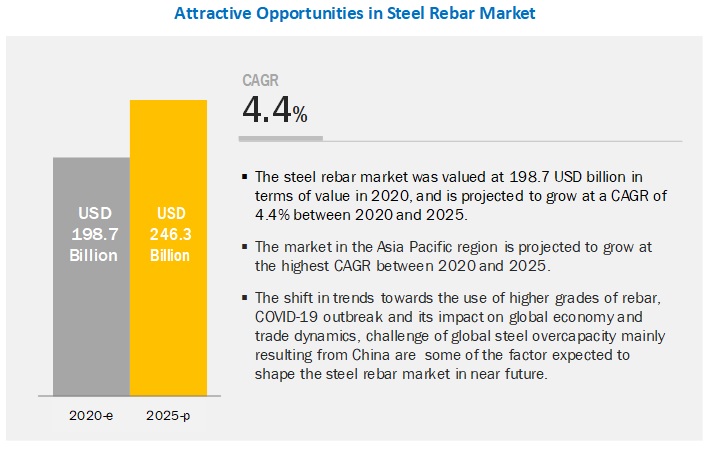“Steel Rebar Market by Type (Deformed & Mild), Process (Basic Oxygen Steelmaking & Electric ARC Furnace), End-Use (Housing, Infrastructure, Industrial), Region (North America, EU, APAC, MEA, South America) – Global Forecast to 2025″ The global steel rebar market size is projected to grow from USD 198.7 billion in 2020 to reach USD 246.3 billion by 2025, at a CAGR of 4.4% from 2020 to 2025. The major drivers for the market include the increasing use of higher rebar products, the development of value-added products, capacity expansion by steelmakers all around the world, increasing population, and rapid urbanization. However, the current steel rebar industry is also plagued by the recent outbreak of COVID-19 and its impact on the global economy, which is expected to deter the demand for steel rebar during the forecast period
Download PDF Brochure: https://www.marketsandmarkets.com/pdfdownloadNew.asp?id=176200687
Recent Developments
1. ArcelorMittal in January 2020, secured a supply contract of rebar for the construction of a new liquefied natural gas (LNG) terminal, located near Kuwait City.
2. In November 2019, Gerdau S.A. agreed to buy 96.4% of Siderúrgica Latino-Americana (Silat) shares from Spanish group Hierros Añón for USD 110.8 million. Silat is located in Caucaia, a city in the northeastern Brazilian state of Ceará, and has a capacity of 600,000 tonnes per year of long rolled steel. The company mainly produces rebar and wire rod. Silat was a close competitor of Gerdau in the rebar market, and with this acquisition, the company has cemented its market position in the rebar market.
The Asia Pacific steel rebar market is projected to grow at the highest CAGR between 2020 and 2025. Growth in this market is attributed mainly to the increasing steel rebar consumption in the construction industry coupled with large steelmaking capacities and consumption of steel rebar in countries such as China, India, Japan, and South Korea.
Increasing building & construction activities supported by a rapidly growing population, need for new residential housing, and major infrastructure investment projects announced in countries like China is expected to create future market avenues for steel rebar industries. In addition, strong policy initiatives such as the mandatory use of domestic steel in government infrastructural projects, shutting of environmentally hazardous blast furnace capacities and increasing use of electric furnace to produce steel rebar from scrap in China and National Steel Policy introduced in India to make the country self-sufficient in terms of steel production are some of the factors expected to support the growth of the domestic steel rebar market. However, currently, the world is facing a crisis related to the outbreak of coronavirus disease by which the world trade, travel, and even the domestic activities have come to a standstill. This is having a severe impact on the Chinese steel industry, which is home to 60% of the world’s steel rebar production.
Major market players covered in the report are ArcelorMittal (Luxembourg), Gerdau S.A (Brazil), Nippon Steel & Sumitomo Metal Corporation (Japan), Posco SS Vina, Co. Ltd (Vietnam), Steel Authority of India Limited (India), Tata Steel Ltd. (India), Essar Steel (India), Mechel PAO (Russia), Nucor Corporation (U.S.), Sohar Steel LLC (Oman), Celsa Steel UK (U.K.), Ansteel Group (China), Hyundai Steel (South Korea), Kobe Steel, Ltd. (Japan), Jiangsu Shagang Group Co., Ltd. (China), JFE Steel Corporation (Japan), Commercial Metals Company (U.S.), Daido Steel (Japan), Barnes Reinforcing Industries (pty) Ltd (South Africa), Jindal Steel & Power Ltd. (India), Steel Dynamics, Inc. (U.S.), Outokumpu Oyj (Finland), Acerinox S.A. (Spain), Hyundai Steel Company (South Korea), Daido Steel Co., Ltd. (Japan), and Byer Steel Group Inc. (U.S.).
To speak to our analyst for a discussion on the above findings, click Speak to Analyst




